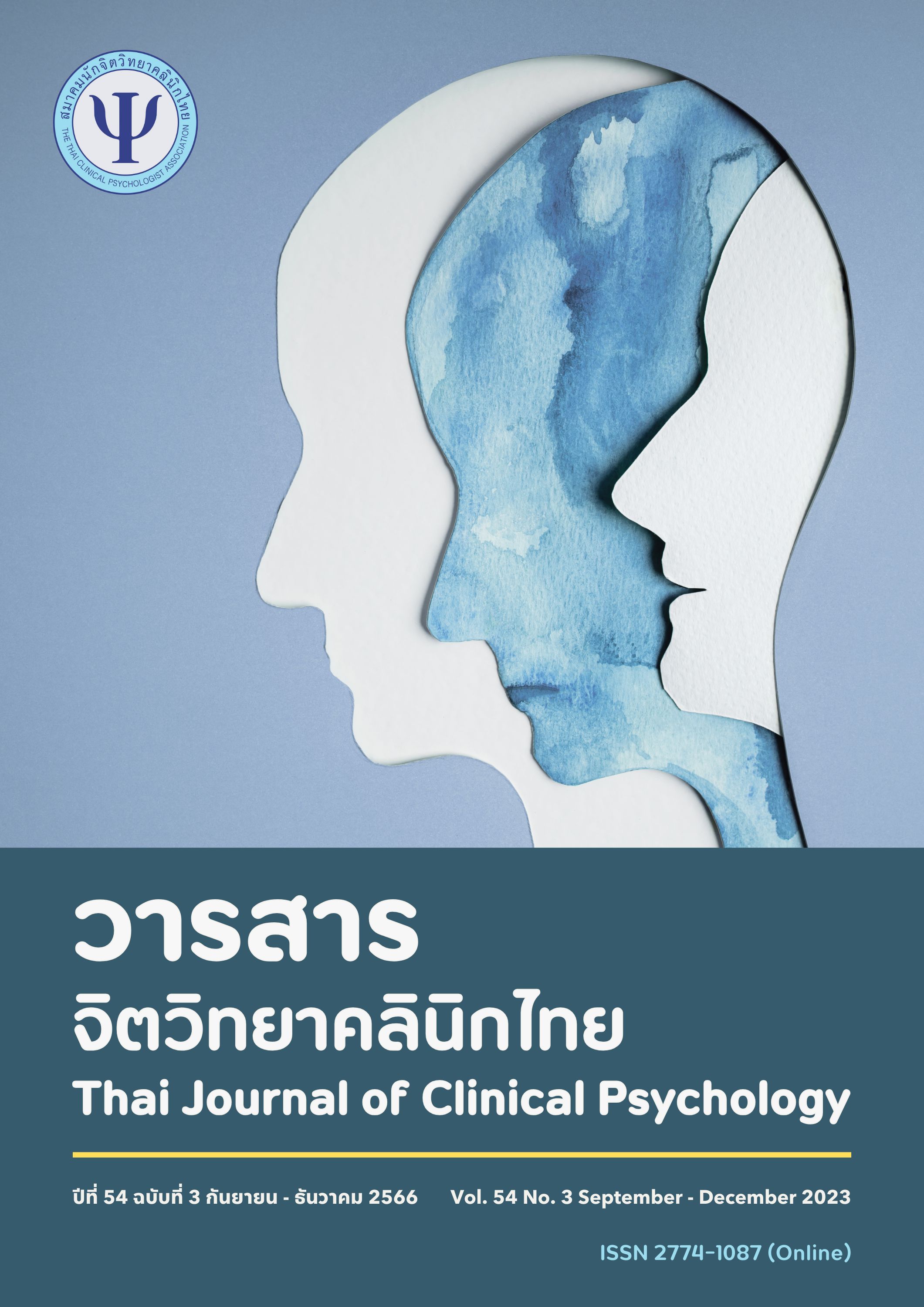ความเที่ยงตรงและความเชื่อมั่นของแบบประเมินภาวะหมดไฟในการเป็นพ่อแม่ (Parental Burnout Assessment: PBA) ฉบับภาษาไทย
Main Article Content
บทคัดย่อ
วัตถุประสงค์ การศึกษานี้มีวัตถุประสงค์เพื่อแปลแบบประเมิน parental burnout assessment ฉบับภาษาอังกฤษเป็นภาษาไทย ด้วยกระบวนการแปลข้ามวัฒนธรรมตามแนวทางมาตรฐานของการประเมินแบบรายงานตนเอง ร่วมกับการแปล การสังเคราะห์การแปล การแปลย้อนกลับ และการเทียบเท่าทางวัฒนธรรม และทดสอบคุณสมบัติ ทางการวัดทางจิตวิทยาได้แก่ ความเที่ยงตรงและความเชื่อมั่นของแบบประเมินฉบับภาษาไทย วัสดุและวิธีการ แบบประเมินประกอบด้วย 4 องค์ประกอบ (ความอ่อนล้าในการเป็นพ่อแม่ ความเป็นพ่อแม่ที่ต่างไปจากเมื่อก่อน ความรู้สึกเบื่อหน่ายกับการเป็นพ่อแม่ และความห่างเหินทางอารมณ์กับลูก) จำนวน 23 ข้อคำถาม โดย กระบวนการพัฒนาดังนี้แปลจากต้นฉบับภาษาอังกฤษเป็นภาษาไทย จากนั้นแปลกลับจากภาษาไทยเป็นภาษาอังกฤษ วิเคราะห์ผลการแปล และใช้การประชุมผู้เชี่ยวชาญ แบบประเมินฉบับภาษาไทยที่ได้มีการหาความเที่ยงตรงตามเนื้อหา ความเที่ยงตรงเชิงโครงสร้างโดยทดสอบกับพ่อแม่ชาวไทยจำนวน 517 คน และนำคะแนนที่ ได้มาวิเคราะห์องค์ประกอบเชิงยืนยันเพื่อตรวจสอบความเที่ยงตรงเชิงโครงสร้างทฤษฎีและความเชื่อมั่น ผลการศึกษา แบบประเมินภาวะหมดไฟในการเป็นพ่อแม่ ฉบับภาษาไทย มีความเที่ยงตรงเชิงโครงสร้างทั้ง 4 องค์ประกอบเหมือนต้นฉบับและมีความเชื่อมั่นในระดับดี สรุป แม้แบบประเมินภาวะหมดไฟในการเป็นพ่อแม่ฉบับภาษาไทยจะมีความเที่ยงตรงตามเนื้อหา มีความเที่ยงตรงเชิงโครงสร้างและมีความเชื่อมั่นในระดับดีอย่างไรก็ตาม หากนำมาใช้จริงควรมีการศึกษาเพิ่มเติม เช่น การปรับคำในบางข้อคำถามหรือมีการกลับข้อคำถามให้อยู่ในรูปประโยคทางบวก
Article Details

อนุญาตภายใต้เงื่อนไข Creative Commons Attribution-NonCommercial-NoDerivatives 4.0 International License.
เรื่องที่ลงตีพิมพ์ในวารสารจิตวิทยาคลินิกแล้วถือเป็นลิขสิทธิ์การเผยแพร่โดยวารสารจิตวิทยาคลินิกแต่เพียงผู้เดียว การตีพิมพ์หรือเผยแพร่ซ้ำในที่อื่นต้องได้รับอนุญาตจากกองบรรณาธิการวารสารฯ
เอกสารอ้างอิง
Assel, M. A., Landry, S. H., Swank, P. R., Steelman, L., Miller-Loncar, C., & Smith, K. E. (2002). How do mothers' childrearing histories, stress, and parenting affect children's behaviouraloutcomes? Child: Care, Health,and Development, 28(5), 359-368.
Aunola, K., Sorkkila, M., & Tolvanen, A. (2020). Validity of the Finnish version of the parental burnout assessment (PBA). Scandinavian Journal of Psychology, 61, 714-722.
Beaton, D., Bombardier, C., Guillemin, F., & Ferraz, M. B. ( 2000) . Guidelines for the process of cross-cultural adaptation of self-report measures. SPINE, 25(24), 3186-91.
Beaton, D., Bombardier, C., Guillemin, F., & Ferraz, M. B. (2007). Recommendations for the crosscultural adaptation of the DASH & QuickDASH outcome measures. Institute of Work and Health. http://www.dash.iwh.on.ca/sites/dash/
files/downloads/cross_cultural_adaptation_2007.pdf.
Boateng, G. O., Neilands, T. B., Frongillo, E. A., Melgar-Quiñonez, H. R., & Young, S. L. (2018). Best practices for developing and validating scales for health, social, and behavioral research: A primer. Frontiers in Public Health,
, 149.
Bollen, K. A. (1 9 8 9 ) . Structural equations with latent variables. John Wiley & Sons, Inc.
Cheng, H., Wang, W., Wang, S., Li, Y., Liu, X., & Li, Y. (2020). Validation of a Chinese version of the parental burnout assessment. Frontiers in Psychology, 11, 321.
Crnic, K. A., Gaze, C., & Hoffman, C. (2005). Cumulative parenting stress across the preschool period: Relations to maternal parenting and child behavior at age 5. Infant and Child Development, 14, 117-132.
Deater-Deckard, K. (2005). Parenting stress and children’s development: Introduction to the special issue. Infant and Child Development, 14, 111-115.
Feldman, R., Eidelman, A. I., & Rotenberg, N. (2004). Parenting stress, infant emotion regulation, maternal sensitivity, and the cognitive development of triplets: A model for parent and child influences in a unique ecology.
Child Development, 75(6), 1774-1791.
Hair, Jr., J. F., Black, W. C., Barbin, B. J., Anderson, R. E., & Tatham, R. L. (2006). Multivariate data analysis (6
th ed.). Pearson Education, Inc.
Kline, R. B. (2016). Principles and practice of structural equation modeling (4 th ed.). Guilford Press.
Kwok, S., & Wong, D. (2000). Mental health of parents with young children in Hong Kong: The Roles of parenting stress and parenting self-efficacy. Child & Family Social Work, 5(1),57-65.
Latson, S. R. (1995). Preventing parent burnout: Model for teaching effective coping strategies to parents of children with learning disabilities. Selective Mutism Association. http://www.selectivemutism.org/wp-content/uploads/2016/06/Preventing-ParentBurnout.pdf
Mikolajczak, M., Gross, J. J., Stinglhamber, F., Norberg, A. L., & Roskam, I. (2020). Is parental burnout distinct from job burnout and depressive symptoms? Clinical Psychological Science. 8(4), 673-689. https://doi.org/10.1177/2167702620917447
Narkpongphun, A., & Charnsil, C. (2019). Crosscultural translation and psychometric properties study of aberrant behavior checklist-community, Thai version. Journal of the Psychiatric Association of Thailand, 64(2), 197-206. (in Thai).
Ostberg, M., & Hagekull, B. (2000). A structural modeling approach to the understanding of parenting stress. Journal of Clinical Child Psychology, 29(4), 615-625.
Prasopkittikun, T., Tilokskulchai, F. & Vipuro, N. (2010). Relationship between selected factors and parenting stress in mothers. Nursing Science Journal of Thailand, 28(1), 19-27. (in Thai).
Puttapaun, P., & Sriphetcharawut, S. (2017). Cross cultural validity and reliability of the kid play profile assessment for children aged 6-9 years: Thai version. Journal of Associated Medical Sciences, 50(3), 347-359. (in Thai).
Raykov, T. (1997). Scale reliability, Cronbach’s coefficient alpha, and violations of essentialทtau-equivalence with fixed congeneric components. Multivariate Behavioral Research, 32(40), 329-353.
Roskam, I., Brianda, M.- E., & Mikolajczak, M. (2018). A step forward in the conceptualization and measurement of parental burnout: The parental burnout assessment (PBA). Frontiers in Psychology, 9. https://doi.org/10.3389/
fpsyg.2018.00758.
Roskam, I., Raes, M.- E., & Mikolajczak, M. (2017). Exhausted parents: Development and preliminary validation of the Parental Burnout Inventory. Frontiers in Psychology, 8. https://doi.org/10.3389/fpsyg.2017.00163.
Sawasdipanich, N., & Tiansawad, S. (2011). Instrument translation for cross-cultural research: Technique and issues to be considered. Thai Journal of Nursing Council, 26(1), 19-28. (in Thai).
Stănculescu, E., Roskam, I., Mikolajczak, M., Muntean, A., & Gurza, A. (2020). Parental burnout in Romania: Validity of the Romanian version of the parental burnout assessment (PBA‐RO). New Directions for Child and Adolescent Development, 2020(174), 119-136.
Tabachnick, B. G., & Fidell, L. S. (2007). Using multivariate statistics (5th ed.). Pearson Education, Inc.
Vigouroux, S. L., Scola, C., Raes, M.- E., Mikolajczak, M., & Roskam, I. (2017). The big five personality traits and parental burnout: Protective and risk factors. Personality and Individual Differences, 119, 216-219.


